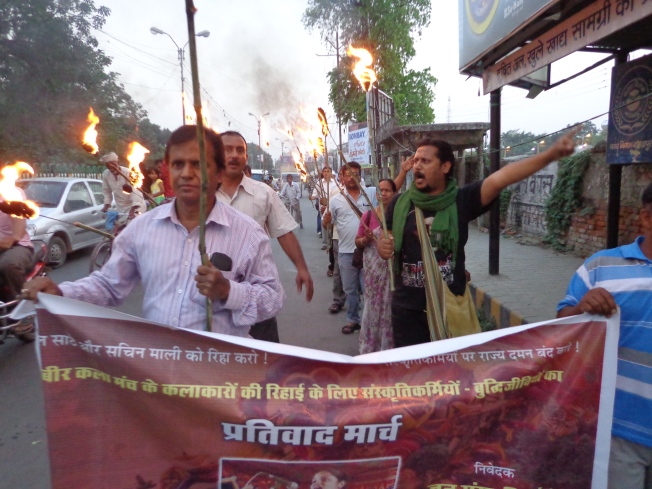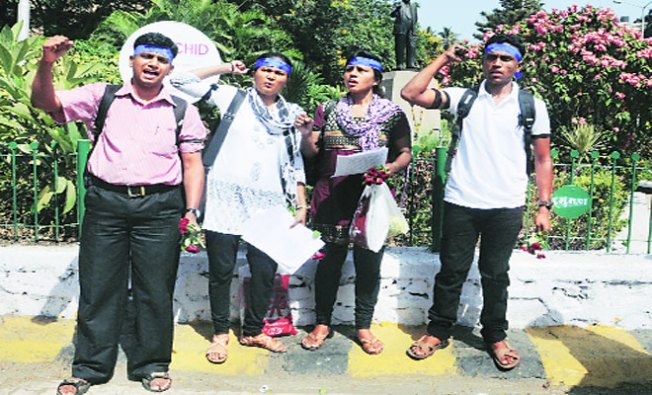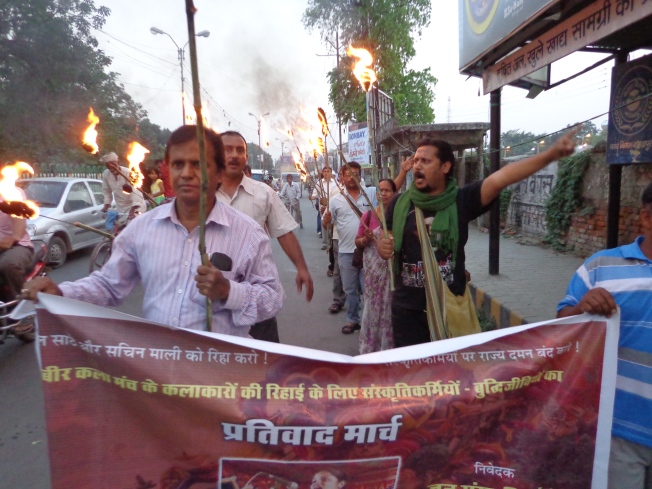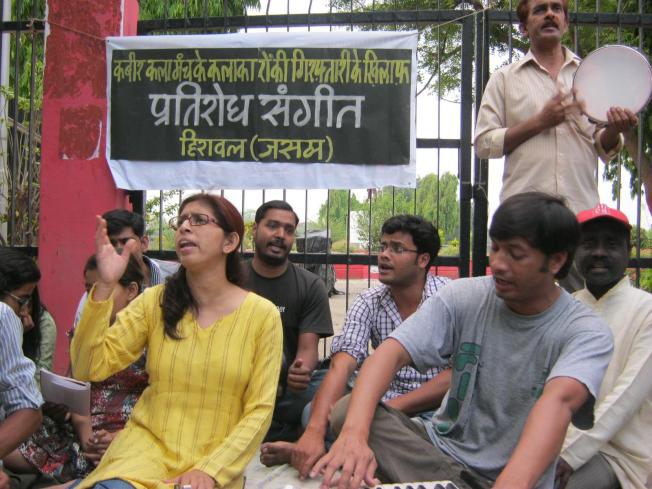After voluntarily courting arrest, Dalit activist and performer Sheetal Sathe is finally out on bail. But why was she arrested under the UAPA law in the first place? If she wasn’t a Maoist, what danger did this pregnant woman pose to the government of Maharashtra? A profile of the woman they call ‘Maharashtra’s Gaddar’.
 By Bhanuj Kappal | Grist Media – Mon 8 Jul, 2013
By Bhanuj Kappal | Grist Media – Mon 8 Jul, 2013
 Sheetal Sathe
Sheetal SatheOn June 27, 2013, Sheetal Sathe finally got bail.
I first met Sandhya Sathe, Sheetal’s mother, outside Mumbai’s Byculla Jail in late June. She had spent the last few hours trying to see her daughter, who is eight months pregnant. She looked tired and worried. Policemen stared at us as they walked by, looking pointedly at the recorder in my hand. “Even now, I have no idea what’s going on,” she told me then. “I know nothing about politics. I’d never been to a court till all this happened. I hope she gets bail and the government lets us live the rest of our lives as normal citizens.”
Her daughter, 28-year-old singer-poet Sheetal Sathe, is the president of the cultural protest group Kabir Kala Manch (KKM). At the time, Sathe had already spent two months in prison on charges of being a Naxalite, after she and her husband courted arrest in April. Despite her mother’s fervent prayers, Sathe’s bail hearing was postponed by a week because the Maharashtra government had not bothered to file a reply. She spent 10 more days inside, worrying about the lack of medical facilities and the effect of prison food on her unborn child.
Today, three of her fellow KKM activists are still imprisoned on similar charges. Their crime? Using their art to expose injustice and register their dissent against the State.
I first came across Sathe and KKM while watching Jai Bhim Comrade, Anand Patwardhan’s powerful documentary on Dalit protest music. Even in a film full of inspiring music and stories, KKM’s performances stood out. Partly, it was the way they use dry wit and satire to drive home their scathing sociopolitical commentary. It helps that they are fiercely talented. Mostly, they fascinated me because their songs communicate the anguish and anger of India’s underprivileged millions in a way that no speech or newspaper report ever can. When Sathe sings about the poverty and exploitation of the Dalit community, your chest constricts in rage. When she sings of a mother going hungry in order to feed her children, her voice wrenches you out of the layers of indifference and apathy. And when she calls for a ‘truly democratic revolution’, she makes you want to be the first one to the barricades.
Is it this articulation of daily injustice and oppression, distilled from raw, lived experience that makes this motley group of young poets and singers a threat to the biggest democracy in the world?
*****
The members of the Kabir Kala Manch come from the same bastis and slums as their audience. Sathe grew up in Pune’s Kashewadi slum, where the rest of her family still lives. Her mother worked as support staff in the intensive care unit (ICU) at Ruby Hall hospital for Rs 11 a day. This, and the few rupees she earned begging for alms in the name of the goddess Mahalaxmi Devi, all went towards bringing up her three children. Determined to guarantee them a better life, she made sure that Sathe went to a good school rather than the local municipal school. Sathe’s love for music grew amongst her very devout family, who gathered regularly in her house to sing devotional songs. And at school she got a chance to hone her talent.
“Sheetal loved to sing and was always the first to be picked to sing at cultural events in her school. That’s where she got her confidence,” says KKM activist Rupali Jadhav, who is also from Kashewadi.
By the time she was in junior college, Sathe was on the lookout for other opportunities to sing in public. It was her cousin Sagar Gorkhe, also a very talented singer, who told her about a cultural troupe that would be happy to give her a platform for her music.
KKM was founded in 2002 as a response to the Godhra riots and the ensuing rise in communal tensions. “Ramesh (Gaichor) was one of the founding members, along with Yogendra Mane, Amarnath Chandaliya, Haroon Sheikh, and a few other people,” says Deepak Dengle, who joined the group in 2004. “They thought that after the Gujarat riots, something must be done to promote Hindu-Muslim unity.”
The group did a number of shows around the city under the ‘Awaaz Do’ banner. But by the time Sathe and Gorkhe joined the group, a lot of the original team had left or been kicked out, as part of the churning all young groups undergo. They were replaced by new blood and a new focus on Dalit and workers’ rights.
Sathe had no interest in activism when she joined KKM, but that soon changed. Dengle says: “She only wanted to sing, but she got interested in politics because being a Dalit from the slums, she was sensitive to the real suffering of the poor. Like us, she felt her songs should be of service to the people.”
Her political education was helped by the regular study circles conducted by the group. Members would be assigned different subjects to study, and then they would discuss their research with the rest of the group. Heavyweights from the Left and Dalit movements, such as members from the Vidrohi Sahitya Sammelan (an alternative Marathi literature conference that spawned the Vidrohi movement), were also invited to speak at these sessions.
Sathe was a quick learner. “She had a great curiosity. No one had to push her,” says Dengle. “If she came across a new idea, she’d study it immediately.” It was at these discussions that KKM developed and formalized its political ideology — a potent mix of Ambedkarite and Marxist thought. It was also at these study circles that Sathe met the man she would eventually marry.
Sachin Mali was already a fairly experienced activist by the time he joined KKM. He had worked with the Vidrohi Sahitya Sammelan and had been an active member of the Students Federation of India (SFI) while studying at Tasgaon, Sangli. He shifted to Pune for work. Mali took up work as a bus conductor and joined the local chapter of SFI, but was unhappy with the way that organization functioned. A big fan of revolutionary poet-balladeer Sambhaji Bhagat, he started looking for a group that sang Bhagat’s songs. It didn’t take him long to join the KKM, where he impressed everyone with his poetry, his intelligence and, in Sathe’s case, his good looks as well. Says Dengle, “Sachin was a poet, had worked in activism, had a personality that impressed Sheetal. They were attracted to each other. We were very happy that they’d found love within our group.”
Unfortunately, neither family shared Dengle’s enthusiasm since the two were from different castes. Sathe already had regular arguments with her mother over the latter’s devotion to the religion that Sathe viewed as the root of her community’s problems. So it wasn’t entirely unexpected when her mother kicked her out of the house when she found out about the romance with Mali. At Mali’s end, too, the strongest opposition came from his mother who was firmly against the marriage.
The other KKM members put Sathe up in a women’s hostel and encouraged her to keep studying. (She was studying for an MA in sociology at Siddhivinayak College but was not a gold medalist from Fergusson College as many newspapers have reported. It was Sachin Mali who had been a gold-medal winning student in Sangli.) Sathe and Mali’s friends and well-wishers intervened to try and convince the families to accept the match. In the end, Sathe’s mother and Mali’s father and sister attended their wedding, an inexpensive and intimate ceremony on the lines of a Satyashodhak ceremony. (The 19th century reformer Jyotirao Phule’s Satyashodhak Samaj had pioneered inter-caste wedding ceremonies, which do not require the presence or sanction of Brahmin priests.)
“We didn’t want it to be the bland, boring weddings that happen in Left circles,” says Rupali Jadhav. “We wanted to make it celebratory, to show that we believed in what we told people and were happy to apply our message to our own lives.” The wedding was attended by heavyweights from the progressive movement, many of whom performed songs, dances or gave speeches to celebrate their union.
Until this point, the KKM performances had been sporadic, with the group focusing on honing their music and street theatre into the unique artistic voice it is today. They were helped in this task bySambhaji Bhagat, who regularly travelled to Pune to train the group. Bhagat, who formed a close bond with the group, was particularly impressed by Sathe. “Sheetal isn’t just a good singer, she is also a really good poet,” he says. “She can write really well and her songs are complex, unlike most political songs.”
Take for example a song in which KKM lambasts the Dalit political leadership for selling out their community. Sathe quotes Dr BR Ambedkar’s warning that if the constitution failed to provide social and economic justice to the Dalits, it would be brought down. She taunts her audience for not challenging the political leaders who have betrayed them and calls for a new Ambedkar for a new era:
“Better to sacrifice this body
than live like a corpse
Open your eyes to the
dream of Dalit martyrs
And create a new Bhim
For our new era.”
That isn’t the only way that KKM’s music differs from that of their peers. While they fit firmly in the tradition of Dalit-Left folk music embodied by poet-singers like Vilas Ghogre, Gaddar and Annabhau Sathe, they don’t limit themselves to those forms. They don’t care about whether a musical or cultural form is borrowed from another community or culture. Their philosophy, as Dengle puts it, is that ‘art is art and if it works, we’ll use it’. As a result, they were one of the first protest music groups to use western instrumentation regularly. They would constantly be on the lookout for new musical styles that they could experiment with. This sheer diversity of influences is part of what makes their music so appealing to those outside the Dalit-Left movements as well. This was not a group happy to merely preach to the choir.
Then Khairlanji happened, an event that influenced not only KKM but a whole generation of Dalit youth. On 29 September, 2006, a Dalit family was brutally slaughtered in Khairlanji, a village in the Bhandara district of Maharashtra. There were allegations the women had been paraded naked around the village and raped, and that the police were trying to protect the perpetrators. Yet the news was greeted with silence, not only from the government and the media but also by the mainstream Dalit parties.
A month later, appalled by the government’s continued indifference, Dalit youth took matters into their own hands. Protests and riots broke out all over Maharashtra. Their outrage only grew when Home Minister RR Patil dismissed the protests as the work of Maoists.
KKM jumped into the deep end of the struggle. “During the Khairlanji protests, we were on the streets every day,” says Dengle. “When the protesters threw stones at the police, we were there. Every time we heard about a rally or a protest, we’d go and perform in order to motivate the protesters and raise their spirits.” They were rewarded for their efforts by being put on a list of 26 organizations (including Medha Patkar of the National Alliance of People’s Movements and Baba Adhav) that the government claimed had links to the Maoists. The State had been watching, and they had been spotted.
Khairlanji had a profound effect on the group. Their songs became more militant, their demands for justice and revolution more strident. Dengle says, “After Khairlanji there was all this rage. When we saw what had happened, and how the State acted after the atrocity… anger automatically comes out in your songs, your politics, your life.”
They intensified their struggle. They performed at bus stops, at bastis, on the roadside. They were present at every protest in or around Pune, performing their plays and singing songs about the exploitation of the Dalits and the poor. Their targets included the proposed nuclear plant at Jaitapur, the controversial Lavasa development, NCP supremo Sharad Pawar and the police. When the Medha Patkar-led Narmada Bachao Andolan gherao-ed the Congress headquarters in Dadar in 2008, KKM was there. People soon started calling Sathe ‘Maharashtra’s Gaddar’.
Anyone with a working knowledge of the Indian State’s treatment of dissent will know what comes next. It was time for the other shoe to drop.
*****
In April 2011, the police made their move. The Maharashtra Anti-Terror Squad (ATS) arrestedschool teacher and activist Angela Sontakke, who they claim is a senior member of the Communist Party of India (Maoist). Six other arrests followed. KKM activists Deepak Dengle and Siddharth Bhonsle were arrested. On 20 July 2011, the police filed charges against all seven – and eight others who could not be located, including Sathe and Mali – under the draconian Unlawful Activities Prevention Act (UAPA).
Alarmed by news of the arrests and worried about their own safety, the rest of the group went underground. Unable to track them down, the police settled for harassing their families instead. “Police would come every day,” said Sandhya Sathe, who had to quit her job because of the case. “Even now that Sheetal is inside, the ATS people come on a regular basis. Now they ask after the two kids [KKM activists] who are still underground. They offer money. They say we’ll give you 10 lakh, we’ll give you a good house. I don’t know anything at all, so what do I tell them?”
Dengle believes KKM was implicated in the case because of their acquaintance with Sontakke, whose CPI (M) connections were unknown to the group. When the police caught Sontakke, they probably saw a chance to kill two birds with one stone.
Sadly, this is standard operating procedure for the police in India when dealing with anyone linked to groups or ideologies that they perceive as anti-nationalist. A comprehensive investigation by the news portal Gulail.com recently proved that the Uttar Pradesh government had knowingly prosecuted several innocent Muslims in terror cases and hid evidence of their innocence from the courts. It is just one shocking example of how our police and governments abuse their power – often targeting political dissidents instead of doing the painful investigations required to find those who actually commit crimes.
Closer home in Maharashtra, there are a number of recent cases where Dalits have been arrested and charged with sedition for possessing books by Bhagat Singh, and just as startlingly, the works of Dr BR Ambedkar, the architect of India’s constitution. In Tamil Nadu, over the course of one year, 8,000 people protesting peacefully against the Koodankulam nuclear power plant have been booked for sedition and waging war against the State. Arun Ferreira, Sudhir Dhawale and Binayak Sen are only three more examples from a long litany of names of activists booked under similar charges.
One and a half years passed since the post-Khairlanji crackdown. Dengle and Bhosle were still in prison, the rest were still in hiding. Meanwhile, public support for KKM was growing, largely thanks to the film Jai Bhim Comrade and the efforts of the KKM Defense Committee (including documentary filmmaker Anand Patwardhan and several activists). But there was little action on the ground till February 2013, when the bail pleas of the seven people in custody reached the Bombay High Court. In an unexpected but welcome decision, Justice Abhay Thipsay of the high court granted bail to Deepak Dengle, Siddharth Bhosle and two others arrested in the same case.
Justice Thipsay ruled that “suspects could be sympathizers of Maoist philosophy but none can be said to be active members of banned CPI (Maoist)”. He went on to express his mild shock at the evidence based on which the KKM activists had been imprisoned, saying, “It is surprising that highlighting the wrongs prevalent in the society and insisting that there is a need to change the situation was considered as evidence and used to convince the court of them being members of the Communist Party of India (Maoist).”
Encouraged by this decision, Sheetal Sathe and Sachin Mali appeared in front of the Vidhan Sabha building in Mumbai and courted arrest on April 2, 2013. Before the ATS took them into custody, the young couple read out a statement. They said this was not a surrender, this was a satyagraha and that they were sure they’d be acquitted of all charges. A month later, four more KKM members surfaced, though this time they had to wait a few hours before the ATS turned up to take them into custody. Sagar Gorkhe and Ramesh Gaichor were arrested, while the others were allowed to go home.
*****
June 27. Sheetal Sathe has been granted bail.
The other three, including Sathe’s husband Mali, have filed bail applications, and are hopeful that they will be out soon as well. But this is only the first step. They still have a case to fight, one which could stretch for years in a country where 30 million cases are pending in courts across the nation. And then there’s the stigma of being branded a Naxalite, the police scrutiny that will never go away, the ever-looming threat of fresh arrests and fresh charges.
On the evening of 27 July, as KKM supporters and well-wishers were celebrating Sathe’s bail, Deepak Dengle and Rupali Jadhav were arrested by the Pune police. They had been singing at a demonstration of Varkaris protesting builders taking over the Bhandara and Bhamchandra hills where the 16th century saint Tukaram is said to have lived.
It was just another reminder from the police that when it comes to dissenters against the State, there are no happy endings.
Bhanuj Kappal is a freelance journalist who writes about music, art and cultural politics. Follow him at https://twitter.com/StonerJesus.
Related articles
- Sheetal Sathe of Kabir Kala Manch granted bail at last ! #Freekabirkalmanch (kabirkalamanch.wordpress.com)
- Enemies of the state: The continuing andolan of the Kabir Kala Manch (kabirkalamanch.wordpress.com)
- #India: Stop Misuse of Counterterrorism Laws #KKM (kabirkalamanch.wordpress.com)







